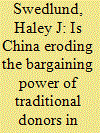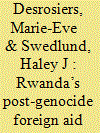|
|
|
Sort Order |
|
|
|
Items / Page
|
|
|
|
|
|
|
| Srl | Item |
| 1 |
ID:
153848


|
|
|
|
|
| Summary/Abstract |
In this article, the author explores whether the growing presence of Chinese financial assistance is decreasing the bargaining power of traditional donors vis-à-vis African governments. The article relies on data from an original survey of high-ranking donor officials working in multiple African countries, as well as case-studies of Chinese engagement in three diverse African country contexts: Ghana, Uganda and Tanzania. It finds that claims of a ‘silent revolution’ in development cooperation due to China's increased involvement in the region are overstated. Among donor officials, there is far from consensus that China is decreasing the bargaining power of their agency. On the contrary, evidence from Ghana, Tanzania and Uganda suggests that traditional development aid continues to play an important role and that, in practice, China rarely directly competes with traditional donors. There are, however, two important caveats to this claim. First, when China and traditional donors do directly compete—for example, on infrastructure projects—many recipient governments prefer assistance from China. Second, given China's interest in expanding markets and acquiring natural resources, countries receiving higher amounts of Chinese official finance are likely to have lower rates of aid dependence. As a result, financing from China is likely to be correlated with a decline in the bargaining power of traditional donors, even if it is not causing such a decline.
|
|
|
|
|
|
|
|
|
|
|
|
|
|
|
|
| 2 |
ID:
168269


|
|
|
|
|
| Summary/Abstract |
This article studies donor–government relations in Rwanda since the end of the 1994 genocide. The notion that Rwanda enjoyed or enjoys exceptional relations with donors because of guilt regarding their inaction during the genocide is widespread in the literature and in policy circles. To assess this myth, the article first looks at aid trends for Rwanda and comparable countries, and then takes an in-depth look at aid relations with two average-size donors: Canada and the Netherlands. It demonstrates that Rwanda is not as exceptional as claimed, but instead should be considered one amongst a group of exceptional cooperation partners. The article further highlights that donors operated informally immediately following the genocide, but soon renormalized aid relations, and that there has always been a complex set of rationales determining donor behaviour regarding Rwanda.
|
|
|
|
|
|
|
|
|
|
|
|
|
|
|
|
|
|
|
|
|